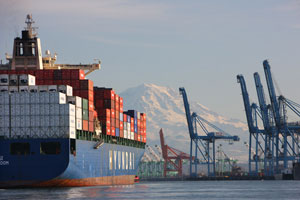November Cargo Rises at Savannah, Pacific Northwest Ports

Cargo volumes continued to increase in November at Savannah, Georgia, where container cargo climbed 4.7%, and the combined ports of Seattle and Tacoma, Washington, whose 18% growth was affected by union contract-related activity.
Savannah moved 284,122 industry-standard 20 foot container units, or TEUs, to post the highest November total ever, the Georgia Ports Authority said in a statement. The Northwest Seaport Alliance, the combination of Pacific Northwest ports, moved 283,945 TEUs. November 2014 was the first month when cargo was slowed in connection with contract talks between the International Longshore and Warehouse Union and the Pacific Maritime Association.
Growth at those two ports was the latest sign of upbeat international freight activity, coming just days after Los Angeles and Long Beach, California, the two largest U.S. ports, posted a combined 7% year-over-year increase in shipments measured in TEUs.
Savannah and Seattle/Tacoma are running neck and neck for fourth place in the United States, trailing Los Angeles and Long Beach and third-largest New York/New Jersey, where cargo totals for November haven’t yet been disclosed.
“Our deepwater ports put in an outstanding performance, expanding on an 11.6% increase in container traffic achieved last November, when Savannah was handling diverted cargo from the West Coast,” Georgia Ports Authority Executive Director Curtis Foltz said in a statement.
At Savannah, 222,313 TEUs were loaded, including 124,773 for export. The balance of the moves were repositioning of empty containers. In the Pacific Northwest, the load total was 225,705, about equally divided between imports and exports.
At Seattle/Tacoma, cargo moves for 11 months of 2015 are 6% higher than 2014. Over that period, exports have increased 11%.
A port statement said the growth was due to “Washington state’s agricultural sector. The state is home to one of the most productive growing regions in the world, and NWSA terminals provide easy access to markets overseas.”
“Georgia’s demonstrated ability to move cargo without congestion or delay is a major draw for our deepwater ports,” GPA Board Chairman James Walters said. “By making strategic investments in new ship-to-shore cranes, container-handling equipment and improved truck access, we will continue to provide capacity ahead of demand.”

